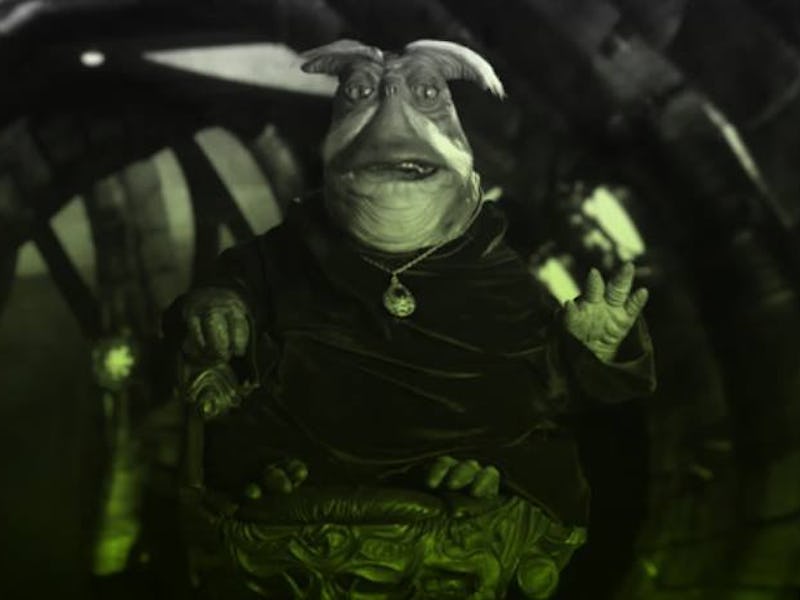A Tribute to 'Farscape''s Rygel, Science Fiction's Forgotten Muppet Sidekick
"Shall I disrobe so it's memorable?"

From Alf, to Rizzo the Rat, to Salem from Sabrina the Teenage Witch, to Frozen’s Olaf, there have been any number of wise-cracking “critter” characters in pop culture who elicit, for better or much worse, strong feelings. Your humble author is prenaturally disposed, for whatever sordid reason, to love all of them. Naturally, the Muppets were always one of my favorite entertainment troupes, period, in any cultural arena. And like anyone who grew up loving the Muppets, I will never be able to love any CG sea of pixels, no matter how expressive, as much as I love a good puppet.
The Muppets proper have returned for our jaded generation, like pale shadows of themselves, and we have, by now, reified a selective notion of what the Henson empire was like at its greatest. The worthy, sometimes, have been preserved; a cult for annual Muppet Christmas Carol viewings persists, even if The Dark Crystal dwells in comparative obscurity. In this era of peak nostalgia, we can easily communicate with avid Redditors or other vociferous social media hounds about the old media we love. But there is one creation — effectively, a Muppet — who seems to have been widely forgotten, except by a very particular cadre of old-school Syfy (then “Sci-Fi”) Channel die-hards (the kind who willingly sat through Minotaur reruns) and can regurgitate Babylon 5 one-liners on command. This is animatronic Henson Creature Shop creation Dominar Rygel XVI — the two-foot-tall, lizard-faced, wrongfully dethroned monarch of the planet of Hyneria — who co-starred in the show Farscape.
The grumpy but playful Rygel was a testament to how truly bizarre the Nine Network/Jim Henson Company show was, as a product of a particularly garish, post-Deep Space Nine, gross-looking-alien-studded time in sci-fi television. The visual centerpieces of the show — which either set viewers against it forever or endeared them to its comprehensive weirdness — were the slug-like, tribal-tattooed chin of the irascible renegade Ka D’Argo and Rygel’s leering, gray-green face. With his upper-crust British accent, hoverboard throne, and propensity for farting helium loudly when nervous, Rygel played court jester to the show’s central crew of fugitives. He was comic relief in the purest sense; like Alf before him, his one-liners frequently felt like placeholders. Functionally, they were not jokes, exactly, but simply lines which, over time, created a quirky character the viewer grew to love or despise. At Rygel’s most aggressive moments, perhaps, a cynic might see the shadow of the nadir of the turn-of-the-millenium science fiction sidekick: loathed Gungan Jar Jar Binks.
The tricky thing about truly loving the Dominar is, though he was oddly cute — in the vein of a particularly outlandishly styled English bulldog — he was usually functionally useless on the show. Also, he was the resident narc of the ship Moya. Whenever he had the opportunity to make a deal to be returned to his home planet by the crew’s oppressors — usually, the Peacekeepers — he would attempt to, even if it meant risking the lives of his shipmates. Perhaps it required not giving a shit about any of the other characters — or even the show in general — to embrace Rygel’s often-noxious personality. It’s a shame more Farscape fans weren’t watching the show for fart jokes, but for the few of us that were, almost every move the 26-inch Dominar made was a ray of sunshine even in the most sub-par Farscape episode. When he did end up being helpful to his non-puppet co-stars, it was faintly charming.
Eventually, Rygel became a sad metaphor for changing times in TV and film when he became computer-animated half way through the show’s run. Future-shock effects became important to Farscape; in a VR video game the characters enter into in Season 4, Rygel is a villain in the form of a medieval “Black Knight,” actually ripping the famous Monty Python and the Holy Grail line “None Shall Pass!” Certainly, this is not the pesky, self-serving twerp viewers grew to love or, at least, come to terms with in the show’s first season. Rygel’s transformation was emblematic of the crisis in how to handle “critter” or alien sidekick-like characters in film and television. It was hard to tell if it was a lack of direction on the show that robbed Rygel of some of his charm, or his Internet-age update.
In any case, Rygel — who lost his original form somewhere between The Phantom Menace and Attack of the Clones — became something of a tragic figure, emblematic of the moment the nerds of a certain generation lost their sense of wonder. Still, it would be unfair to repress his memory entirely. Rygel remains one of the most delightfully weird puppets in television history — the veritable Howdy Doody for the kind of people who still defend Star Trek: Voyager. He stands as an example of the kind of small, incongruous pleasures — weird flourishes, apropos of nothing — of which don’t get enough in contemporary sci-fi.